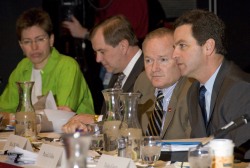
In the midst of an unprecedented integrity crisis in Illinois, Governor Pat Quinn’s first executive order was to charge the Illinois Reform Commission (IRC) with the mission of coming up with specific legislative recommendations within 100 days to clean up the state’s political process and state government. The IRC held eight hearings and seven town hall meetings throughout the state, receiving testimony and ideas for meaningful reform from both national experts on best practice models from other states, and from thousands of Illinoisans who urgently believe that we need real change.
On April 28th, the IRC delivered to Governor Quinn our 100-Day Report, which called for sweeping reform in six areas: transparency, campaign finance, procurement, government structure, enforcement and inspiring better government. Now that the legislative session is mostly over, there is good news, bad news and important, unfinished business to report.
The Good News
The Illinois legislature, in an overwhelmingly bipartisan vote, passed meaningful reform in the areas of transparency and procurement. IRC member Hanke Gratteau, former managing editor for news at the Chicago Tribune, worked tirelessly to negotiate a successful overhaul of the Freedom of Information Act. After a long and distinguished career as a journalist, it was exciting to see Gratteau help pave the way for much greater public transparency. He collaborated with Illinois Attorney General Lisa Madigan’s office to push for the enactment of new “sunshine laws” for Illinois. Their provisions include:
- Creating the position of Public Access Counselor, who can issue binding opinions on public document disputes, under the Attorney General’s office
- Allowing courts to impose civil penalties of $2,500 to $5,000 against public bodies that willfully violate the law
- Ensuring that government bodies cannot improperly withhold public records from disclosure
- Requiring public bodies to produce records in electronic format.
There are over $10 billion in annual state contracts, and the stories of favoritism and manipulation of this process are well known. IRC member David Hoffman, inspector general for the City of Chicago, led the fight for significant changes to the Illinois procurement process. Hoffman, whose office fights corruption in the awarding of City of Chicago contracts, was a pit bull in demanding meaningful procurement reform for the state. In the end, many of the IRC procurement recommendations were passed by the Illinois General Assembly, including:
- The creation of insulated and independent procurement professionals
- Additional scrutiny for sole source and emergency procurements
- Enhancing disclosure requirements of financial information and potential conflicts of interest
- Boosting procurement transparency.
The Bad News
Although IRC Chairman Patrick Collins put up a valiant effort in leading the process to reform Illinois campaign finance laws and strengthen state law enforcement tools to root out public corruption, the end results were disappointing. The campaign finance bill that passed had contribution limits for the first time ever in Illinois—$5,000 for individuals and $10,000 for special interest groups, which will at least curb the outrageous amounts raised by former Governor Rod Blagojevich.
Yet the IRC also recommended curtailing the transfer of leadership transfer funds to targeted state legislative races at $30,000. The bill that passed capped leadership transfer funds at $90,000, but placed no limits on in-kind contributions, which the IRC believes will be a giant loophole to avoid meaningful reform. By way of example, in the 92nd District race to replace former State Rep. Aaron Schock, the two candidates spent $1.5 million, with more than half of the money coming from leadership transfers and over 75 percent coming from outside Peoria County. Ultimately, the IRC felt that the campaign finance bill contained too many loopholes to support.
Chairman Collins, who served as an assistant U.S. attorney for 12 years and was the lead attorney in the prosecution of former Governor George Ryan, argued passionately that our state’s history of public corruption demonstrated a clear need for stronger enforcement mechanisms, such as allowing one-party consent for use of an eavesdropping device. Adoption of this recommendation would bring Illinois in line with federal law and the vast majority of states. The IRC also urged stronger enforcement penalties in public corruption cases involving more than $10,000 and requiring a prison sentence rather than probation. The Illinois legislature balked at passing any of the IRC’s enforcement recommendations.
Unfinished Business
I focused most of my efforts on trying to change our state’s ludicrous redistricting process that results in the most gerrymandered congressional and state legislative districts anywhere in the country. In addition, Illinois is the only state in the country with a “winner-take-all” tie breaker system wherein the Secretary of State draws either a Republican or Democratic name out of Lincoln’s stove pipe hat and that party gets to control the map-drawing process.
The IRC is recommending a modified Iowa model that turns the redistricting process over to an independent, nonpartisan, redistricting consulting firm, using computer software and specific criteria, with public hearings throughout the state. The Senate Redistricting Committee has agreed to conduct four substantive hearings on the redistricting process this summer (one in Peoria on August 19th), and Governor Quinn has agreed to call for a special session on redistricting in the fall, with a vote in both chambers. So this critical issue, which desperately needs to be changed before the next maps are drawn following the 2010 census, is still very much a work in progress.
While the results on ethics reform in Illinois are a mixed bag, I firmly believe that the IRC pushed the Illinois legislature way beyond where they would have gone otherwise. And it was truly a privilege to serve with the 15 men and women from across the state who made up the commission. From Rev. Scott Willis, who lost six children in a fiery crash as part of the license to bribe scandal, to former Senator Paul Simon’s daughter, Sheila, the IRC group was composed of independent, passionate and rightly motivated individuals trying to make an important difference for the future of Illinois. iBi

